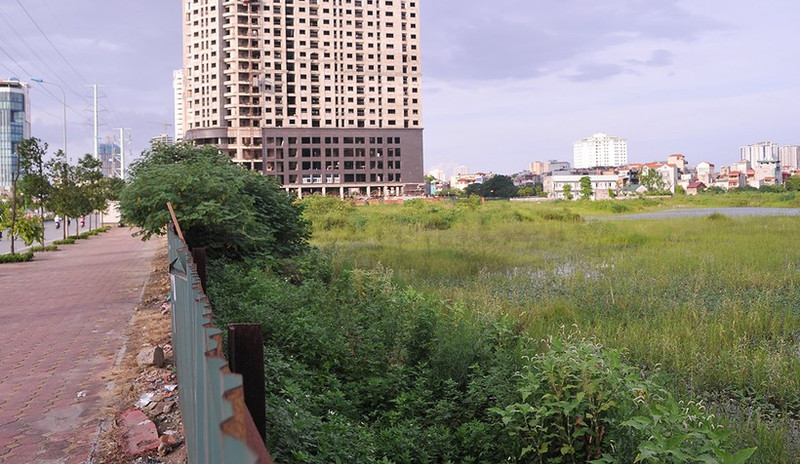Flexible support for enterprises in accessing land resources
Land Accessibility Index is a key component of the Provincial Competitiveness Index (PCI). Enhancing this index is a practical move for localities to create a professional investment environment, support enterprises, and promote sustainable development.

Rising Barriers
Operating in the textile and garment industry, Than Duc Viet, General Director of Garco 10 Corporation, shared that his enterprise has completed the construction of a factory in Thai Binh Province, but it hasn’t come into operation due to administrative procedures related to land and construction.
According to Viet, in order to obtain an operational licence, the factory must undergo an environmental inspection after three months. However, in practice, the enterprise cannot conduct such an inspection before starting operations, creating a contradiction in the process. He noted that this issue does not stem from the local administrative procedures, but from inconsistencies between legal regulations on construction and project acceptance.
Similarly, Nguyen Duc Quang, investor of the HCDWOOD outdoor wood-plastic composite factory project (located in Khai Son Industrial Park, Thuan Thanh, Bac Ninh Province), said that although the project is situated in a planned industrial park with basic infrastructure, the enterprise still faces difficulties in receiving a clean site.
Specifically, several technical infrastructure items such as internal roads, water supply and drainage, or power substations have not been synchronised, affecting the progress of factory construction. Additionally, changes in tax, environmental, and fire safety regulations, as well as regional planning adjustments and how legal provisions are applied in each locality, have significantly impacted master planning and investment cost forecasting.
The PCI 2023 Report identified rising barriers in land access for businesses. The recently released PCI 2024 survey continued to reflect this issue, with the average score for the land accessibility sub-index dropping to 6.54 points, down from 6.75 in 2023.
Specifically, among businesses that carried out land-related administrative procedures, 68% said the biggest obstacle was the time taken to process land documents, which exceeded the deadlines set out in regulations (up from 64% in 2023). 59% of enterprises reported that procedures to determine land-use rights values were overly time-consuming (up from 44% in 2023). Meanwhile, 51% said that officials receiving and handling administrative procedures failed to provide detailed, complete guidance (up from 46% in 2023), and 49% noted that procedures and processes for land documents did not match the officially published content or regulations (up from 46% in 2023).
Explaining this situation, Dau Anh Tuan, Deputy Secretary General and Head of Legal Department at the Viet Nam Chamber of Commerce and Industry, said that although the new Land Law took effect in August 2024, several guiding documents have not been issued. As a result, at the time of the PCI survey, local officials may still have been unclear about specific procedures and processes when businesses sought clarification.
Alarmingly, the proportion of businesses needing land-use right certificates but fearing cumbersome administrative procedures or officials’ misconduct rose to 31% in 2024, up from 21% in 2023. Furthermore, the proportion of businesses that were forced to delay or cancel business plans due to difficulties with land procedures remained high, at nearly 74% in 2024.
Various measures to remove bottlenecks
In fact, local authorities can facilitate business access to land and stabilise business premises through various measures.
In Bac Ninh, Ho Nguyen Hong, Director of the Department of Agriculture and Environment, said that his department had worked closely with localities to address problems in compensation, resettlement support, and land clearance. As a result, the progress of major investment projects has been accelerated. Additionally, the process of granting land-use right certificates to enterprises has been streamlined, reflecting strong administrative reform.
Bac Ninh has also enhanced transparency and openness in planning and land-use information. Planning information is widely published on electronic portals and online platforms, enabling equitable land access for businesses. Notably, the province has implemented measures such as digitising land data, applying planning information systems, and conducting regular dialogue between businesses and authorities to resolve bottlenecks in this area.
In Thai Binh, Nguyen Manh Hung, Deputy Secretary of the Thai Binh Provincial Party Committee and Chairman of the provincial People's Committee, emphasised the motto: “Don't say no, don't say difficulty, don't say yes but don't do it.” The province is committed to addressing business concerns transparently and promptly. Project commencement procedures are actively guided by competent authorities, with connections to relevant ministries and sectors to shorten timelines. Notably, the province has set up dedicated task forces to support key investors.
At the 9th session of the 15th National Assembly, Resolution 198 was adopted, focusing on supporting high-tech enterprises, small and medium-sized enterprises (SMEs), and innovative start-up businesses in accessing land.
Dau Anh Tuan affirmed that this is one of the most anticipated policies by the business community. Most private firms in Viet Nam are micro or small enterprises that cannot afford the high costs in established industrial parks. Therefore, they often rely on residential or village land. This becomes a significant barrier to scaling up for faster development. Thus, the resolution targets pressing issues related to land resources and administrative procedures, with a spirit of state-led transparency and data accessibility through digital platforms.
“Step by step, the aim is to remove existing barriers, attract more resources, and promote business production and operations,” Tuan expressed his hope.
Resolution 198 requires localities to designate land funds for industrial parks, with a minimum size of 20 hectares per park or 5% of the total land fund reserved for enterprises. Simultaneously, the state will offer eligible businesses a 30% land rental reduction for the first five years.








